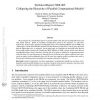Free Online Productivity Tools
i2Speak
i2Symbol
i2OCR
iTex2Img
iWeb2Print
iWeb2Shot
i2Type
iPdf2Split
iPdf2Merge
i2Bopomofo
i2Arabic
i2Style
i2Image
i2PDF
iLatex2Rtf
Sci2ools
114
click to vote
IJFCS
2010
2010
Collapsing the Hierarchy of Parallel Computational Models
We investigate the computational power of parallel models with directed reconfigurable buses and with shared memory. Based on feasibility considerations present in the literature, we split these models into "heavyweight" (directed reconfigurable buses, the Combining PRAM, and the BSR) and "lightweight," (all the other PRAMs) and then find that the heavyweight class is strictly more powerful than the lightweight class, as expected. On the other hand, we contradict the long held belief that the heavyweight models (namely, the Combining CRCW PRAM, the BSR, and the models with directed reconfigurable buses) form a hierarchy, showing that all of them are identical in computational power with each other. We start the process by showing that the Collision write conflict resolution rule is universal on models with reconfigurable buses (in the sense that complex conflict resolution rules such as Priority and Combining can be simulated with constant overhead by Collision).
Related Content
| Added | 05 Mar 2011 |
| Updated | 05 Mar 2011 |
| Type | Journal |
| Year | 2010 |
| Where | IJFCS |
| Authors | Stefan D. Bruda, Yuanqiao Zhang |
Comments (0)

